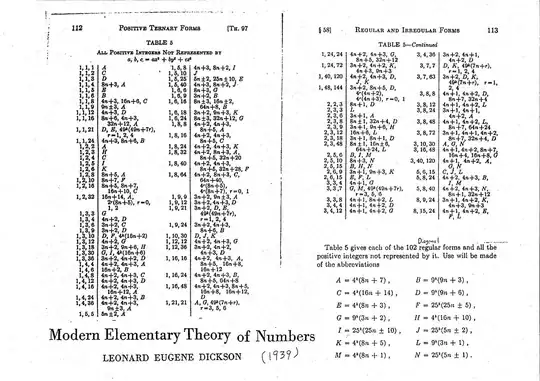I got this equation while I was trying to solve a certain math Olympiad problem. I tried modulus and whatnot, but I haven't got anywhere. Is there a way to prove this?
Asked
Active
Viewed 75 times
0
-
Probably infinite descend – nonuser Jul 01 '19 at 15:15
-
https://math.stackexchange.com/questions/1127654/parametrization-of-solutions-of-diophantine-equation – individ Jul 01 '19 at 15:33
3 Answers
3
Show that all solutions mod $16$ have $x,y,z,a$ all even, and use infinite descent.
Robert Israel
- 448,999
-
After seeing this I have no motivation to finish an answer. One line with no arguments and 3 upvotes. – nonuser Jul 01 '19 at 15:37
0
Solution with infinite descent.
Let $(x,y,z,a)$ be a solution with the smallest possible $a$. Say $a>0$. $$x^2+2y^2+3z^2=10a^2$$
Modulo 2 we get $2\mid x^2+z^2$.
If $x,z$ both odd then $x=2b+1$ and $z=2c+1$ so we have $$4b^2+4b+1+2y^2+12c^2+12c+3 = 10a^2$$ so $2b^2+2b+2+6c^2+6c+y^2=5a^2$ ans thus $2\mid y^2-a^2$
- If $y,a$ both odd, then $y=2d+1$ and $a=2t+1$ so $$b^2+b+3c^2+3c+2d^2+2d=10t^2+10t+1$$ which is impossible since left side is even and right odd.
- If $y,a$ both even, then $y=2d$ and $a=2t$ so $$b^2+b+1+3c^2+3c+2d^2=10t^2$$ which is impossible since right side is even and left odd.
If $x,z$ both even then $x=2b$ and $z=2c$ so we have $$2b^2+y^2+6c^2 = 5a^2$$ so $2\mid y^2-a^2$ and we have two cases again. Can you finish?
nonuser
- 90,026
0
Just for culture:
Showing what numbers are NOT represented is the easy part. These 102 ternary forms are special (among positive forms) in that each does represent all non-excluded numbers.
Will Jagy
- 139,541
